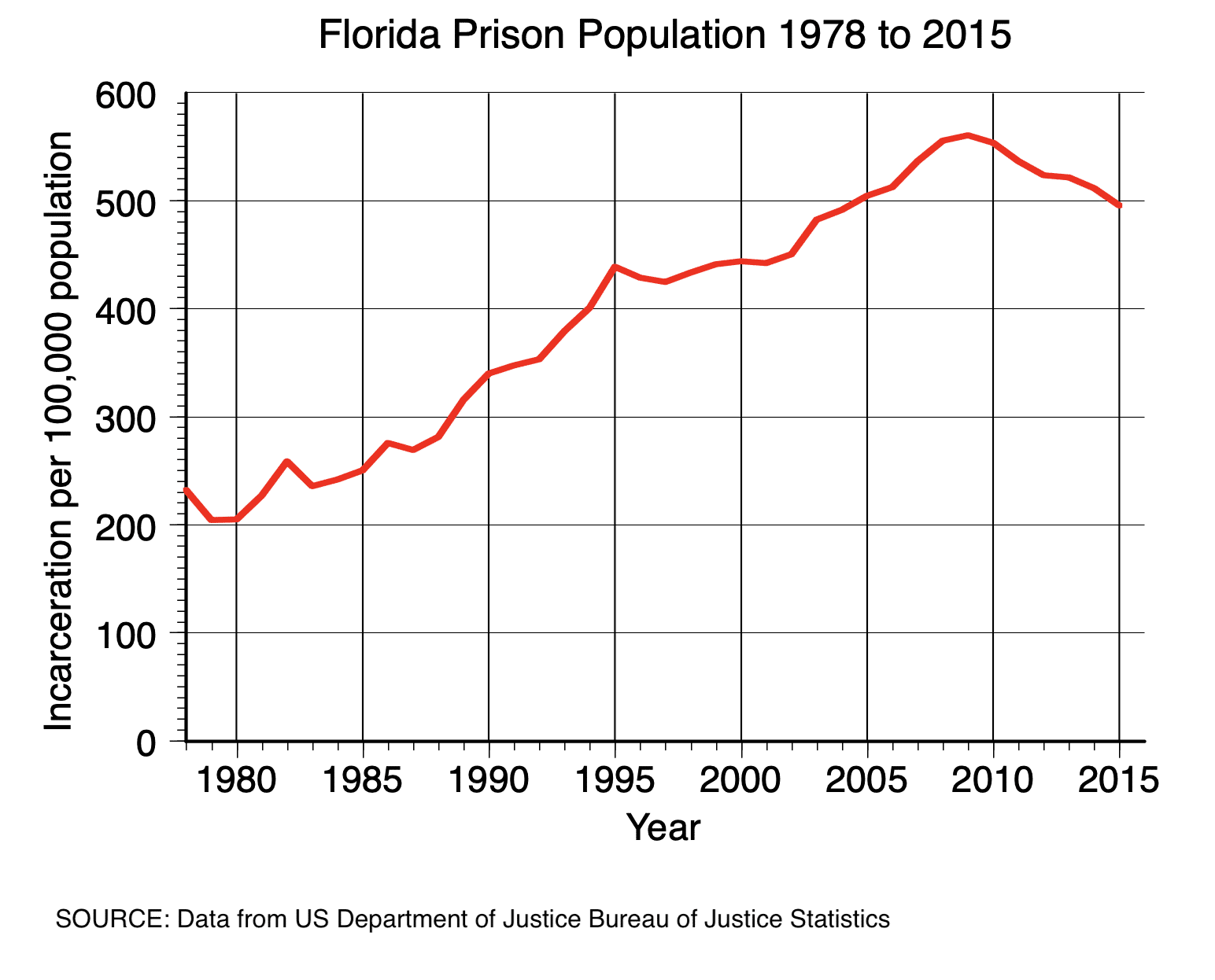
On Feb. 19, 2020, 17 former felons in Florida who want their voting rights reinstated received a favorable decision from the 11th Circuit Court of Appeals. The court’s three judges upheld Amendment 4 to the Florida constitution, which restores voting rights to former felons who have served their sentence. The Amendment took effect after it passed as a ballot measure in November 2018.
Passage of the amendment was only a first step for the victors. In May 2019, the Florida legislature voted to restrict the restoration of voting rights until former felons had paid all adjudication costs. Such costs are defined as money owed to courts in the form of court-cost fees and fines for crimes, as well as court-ordered restitution to victims of their crimes. Some felons could repay their debts and begin voting; the majority could not. The Southern Poverty Law Center called the required payments a “poll tax” and joined with the NAACP, the League of Women Voters of Florida, the ACLU, and former felons to sue to overturn the legislation.
The appeals court agreed with an earlier US District Court ruling that the legislation requiring former felons to pay adjudication costs was financially burdensome. The appellate decision noted that the added legal payment requirement violates the Equal Protection Clause of the US Constitution.
“Wealthier felons are offered access to the ballot while these plaintiffs continue to be disenfranchised, perhaps forever,” the court said in its decision. The court agreed with the plaintiffs that the legal financial obligations imposed by the Florida legislature did not reflect racial discrimination. In the court’s view, “this is a wealth discrimination case.”
The case now goes back to the US District Court for the Northern District of Florida, which had issued the preliminary injunction. The injunction requires Florida to allow the plaintiffs to register and vote if they are able to show that they are genuinely unable to pay their legal obligations. A spokesperson for Gov. Ron DeSantis says he disagreed with the appellate court panel and plans to appeal.
It’s unclear how many felons will be allowed to vote in the Florida primaries and the November general election.
The passage of Florida’s Amendment 4 was considered a decisive step forward in the national struggle for voting rights. Historically, Florida has had one of the most restrictive sets of policies related to restoration of voting rights. After close results in the 2000 presidential race brought national scrutiny, lawsuits arose challenging the law that no felons could vote in Florida.
Then-Governor Charlie Crist pursued a formal process to restore voting rights for certain individuals convicted of mostly nonviolent crimes, if approved by the Florida Parole Commission, and such legislation passed in 2007. Under Gov. Crist, the state restored voting rights to nearly 150,000 people in Florida.
Crist’s successor, Gov. Rick Scott, reversed the rule in 2011, however, and added a seven-year waiting period between the end of a prison sentence (including the end of parole and probation) and applying for voting rights. Gov. Scott slowed the process further by conducting very few reviews; he restored rights to only 3,000 former felons during his term. Ultimately, this system under Gov. Scott favored three times more white males than black males in terms of who obtained voting rights, according to a 2018 investigation by the Palm Beach Post.

Desmond Meade, founder, FRRC
Many people protested the arbitrariness of the system and pushed to introduce Amendment 4 on the ballot. One of this effort’s top leaders, Desmond Meade, was a former felon who founded the Florida Rights Restoration Committee (FRRC) and who, in 2019, was named to Time’s list of the 100 Most Influential People. Previously homeless, he graduated from Florida International University College of Law and headed the movement that gathered nearly 800,000 signatures to put the amendment on the ballot.
The ballot effort expanded to include a diverse set of organizations working toward felons’ voting rights. Joining the FRRC were the Christian Coalition of America, which advocates for being “effective” rather than “tough” on crime, the American Civil Liberties Union (ACLU), and Freedom Partners, a now-defunct nonprofit group whose funders included the Koch brothers. The Kochs have funded many libertarian-conservative causes.
The amendment had to gain 60% of the vote to pass, and it surpassed that figure with a “yes” vote from 64.55% of voters. The measure restored voting rights to 1.4 million people.
Using the courts to undo the wishes of citizens and voters follows a recent pattern in which elected officials and political organizations in other states have imposed burdens on citizens who strive for voting or election reforms. In 2018, for example, a majority of Maine voters chose to implement ranked-choice voting to confront two-party dominance of campaigns. Yet they found their new system delayed by a challenge in court from their elected legislators. Advocates launched a new campaign to collect enough signatures to introduce a People’s Veto in the state – and for a second time, Maine voters chose ranked-choice voting.
A similar situation arose in Michigan when voters elected to form an independent, anti-gerrymandering commission for redistricting. A nonprofit group filed a lawsuit to prevent the initiative from moving forward. The court intervened to reject that lawsuit, and the initiative was voted on and passed.
Florida is not the only state currently trying to restore former felons’ voting rights. According to The Appeal, in 2019 the California State Assembly passed a measure to restore voting rights to those on parole, but the measure stalled in the state Senate. Likewise, in 2019 the Iowa State House passed a measure to restore voting rights upon completion of sentence; the bill stalled in the Senate. Hawaii and New Mexico each had legislation to fully eliminate disenfranchisement move out of committee in their legislatures in 2019.
In February, the legislature in Washington State had a “rancorous debate” on a bill (SB6228) that promised voting rights to any adult citizen residing there who is not in state custody, the Tacoma News Tribune reported. Republican state senators voted down the measure to automatically restore voting rights to those released from state prison, saying felons should not have their rights restored until they complete their prison time, community custody, and restitution to victims.
The Washington case reflects the difficulty of achieving consensus, but as the Tacoma News Tribune reported, the bill’s sponsor, Rep. Patty Kuderer, says that passing legislation to extend voting rights to former felons is the right thing to do.
Sources
11th US Circuit Court of Appeals, Kelvin Leon Jones, Bonnie Raysor, et al. vs. the Governor of Florida and the Florida Secretary of State, Feb 19, 2020, https://www.uscourts.gov/courts/ca11/201914551.pdf, accessed Feb 20, 2020
Ari Berman, “Inside the Unlikely Movement That Could Restore Voting Rights to 1.4 Million Floridians”, Mother Jones, Oct 6, 2016, https://www.motherjones.com/politics/2018/10/inside-the-unlikely-movement-that-could-restore-voting-rights-to-1-4-million-floridians/, accessed Feb 10, 2020
Gary Fineout, “Judge: DeSantis can’t have it both ways on felon voting rights”, Politico, Dec 3 2019, https://www.politico.com/states/florida/story/2019/12/03/judge-desantis-cant-have-it-both-ways-on-felon-voting-rights-1230398, accessed Feb 8, 2020
Samantha J Gross, “Florida voters approve Amendment 4 on restoring felons’ voting rights”, Miami Herald, Nov 6, 2018, https://www.miamiherald.com/news/politics-government/election/article220678880.html, accessed Feb 12, 2020
Georgeanne Usova, “The Democracy Restoration Act: Everyone Deserves a Voice”, American Civil Liberties Union, Apr 24, 2012, https://www.aclu.org/blog/voting-rights/fighting-voter-suppression/democracy-restoration-act-everyone-deserves-voice, accessed Feb 10, 2020
The Brennan Center, “Voting Rights Restoration Efforts in Florida,” May 31, 2019, https://www.brennancenter.org/our-work/research-reports/voting-rights-restoration-efforts-florida, accessed Feb 5, 2020
Christian Coalition, 2020, http://www.cc.org/criminal_justice_reform, accessed Feb. 5, 2020
Florida Rights Restoration Committee, 2020, https://floridarrc.com, accessed Feb 12, 2020
Lulu Ramadan Mike Stucka, Wayne Washington, “Florida felon voting rights: Who got theirs back under Scott?”, Palm Beach Post, Oct 27 2018, https://www.palmbeachpost.com/news/20181025/florida-felon-voting-rights-who-got-theirs-back-under-scott, accessed Feb 11, 2020
Ryan S. King, “Expanding the Vote: State felony Disenfranchisement Reform, 1997-2008, The Sentencing Project, Sep 2008, https://web.archive.org/web/20120119133453/http://www.sentencingproject.org/doc/publications/fd_statedisenfranchisement.pdf, accessed Feb 5, 2020
Michael Wines, “Judge Temporarily Blocks Florida Law Restricting Voting by Ex-Felons”, New York Times, Oct 18, 2019, https://www.nytimes.com/2019/10/18/us/felons-vote-fine-florida.html, accessed Feb 6, 2020
Lawrence Mower, “U.S. judges cast doubt on Florida law requiring ex-felons to pay before they can vote”, Tampa Bay Times, Jan 28, 2020, referenced in Los Angeles Times, Jan 28, 2020, https://www.latimes.com/world-nation/story/2020-01-28/florida-felons-voting-poll-tax, accessed Feb 7, 2020
The Appeal, “Disenfranchisement and rights restoration: Spotlight on states”, https://theappeal.org/political-report/disenfranchisement-states, accessed Feb 24, 2020
James Drew, “Bill to restore felons’ voting rights faster dies on Senate floor”, Tacoma News Tribune, Feb 20, 2020, https://www.thenewstribune.com/news/local/article240453796.html, accessed Feb 20, 2020
Have a Suggestion?
Know a leader? Progress story? Cool tool? Want us to cover a new problem?

